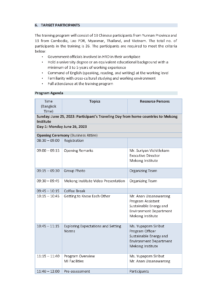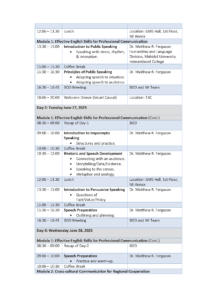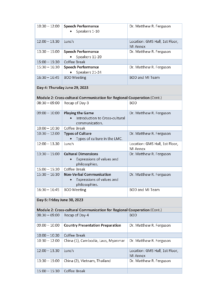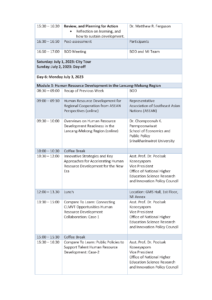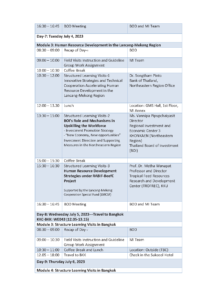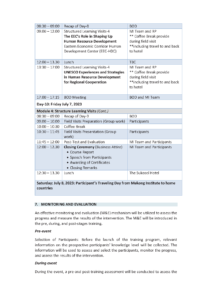
The Lancang-Mekong (LM) Region has immense economic potential and rich natural resources. As many as 75 million people live within the Mekong River Basin area and approximately 1.6 billion throughout the region. This region is experiencing some of the fastest economic growth rates in the world. It is also sustainable and equitable development, but poverty, environmental degradation, a lack of human resources, and differential social development and governance structures hinder it.
The Lancang-Mekong Cooperation (LMC) members are P. R. China, Cambodia, Lao PDR, Myanmar, Thailand, and Vietnam. The six countries along the Mekong River (the Chinese stretch, the Lancang River) launched the LMC mechanism in 2015 and convened the first Leaders’ Meeting in March 2016. The LMC is a sub-regional cooperation mechanism serving the common needs of the six countries, and it is an important part of P. R. China’s overall cooperation with the Association of Southeast Asian Nations (ASEAN). Since the LMC’s launch, the six countries have joined hands and worked in solidarity to promote the high-level development of the new sub-regional mechanism, successfully setting a golden example of regional cooperation and bringing tangible benefits to the people of the six countries. The LMC became a good regional cooperation model of the Belt and Road Initiative.
Human Resource Development (HRD) is a critical component of an increasingly interconnected world and is a fundamental element of a country’s economic future. To be ready to support economic growth in the LM Region, skilled and knowledgeable human resources are essential. The governments in the region need to play a significant role in aligning HRD needs with the country’s economic opportunities by enhancing workforce development while balancing regional development with social and economic needs. It is crucial to integrate a skill enhancement program to support employees in acquiring new skills or workers in improving their capabilities. Talented human resources are the change drivers for the LMC. During the seventh LMC Foreign Ministers’ Meeting on July 4, 2022, P. R. China launched six plans in the next stage to share with the LM countries benefits of cooperation and add development momentum. One of the six plans is to implement the LM Talent Plan.
To support LM countries with these efforts, the Mekong Institute (MI) is going to implement a project of “Comprehensive Human Resource Development for the Lancang-Mekong Cooperation” to develop the human resource capacity of public institutions and will equip government officials with advanced HRD skills, regional perspectives, and professional and personal networks.
The training will be conducted at MI Residential Training Centre, Khon Kaen, Thailand. In this course, participants will be trained in four interrelated modules:
Module 1: Effective English Skills for Professional Communication
Objectives:
- Learn English skills by concept building, practice, and interaction
- Enhance experience and confidence in using English in public speaking with international colleagues
Topics:
- Introduction to Public Speaking
- Voice, stressing, intonation
- Impromptu speaking – finding structure, explanation, and elaboration
- Descriptive Language & Storytelling
- Speaking to a reader’s senses
- Comparison and analogy
- Using personal story as an illustration
Module 2: Cross-cultural Communication for Regional Cooperation
Objectives:
- Widen awareness of the cultural identity of oneself and cultural others
- Acquire skills for negotiating in a cross-cultural situation
- Cross-cultural Communication
- Learning how to play the cultural game together
- Cultural Dimensions and Syndromes
- Cultural Audit & Reflection
- Review of cultural dimensions in the Lancang-Mekong Region
- Case study of culture, development, and local interest
- Cultural Presentations and Questions
- Culture sharing and learning how to maximize communication and cooperation in the Lancang-Mekong Region
Topics:
- Introduction to Persuasive Speaking
- Questions of Fact/Value/Policy
- Speech review and critique
- Design and Use of Visual Aids
- Body language and non-verbal communication
- Cultural forms of communication through body
- Preparing the body to perform in public speaking
- Speech Day Preparation
- Outlining, Workshopping, Practice
- Speech Day – To inform or persuade the audience about issues related to the Lancang-Mekong Region. All participants will perform a 7-9 minutes speech.
Module 3: Human Resource Development in the Lancang-Mekong Region
Objectives:
- Understand the importance of HRD
- Introduce innovative strategies and practices of HRD
Topics:
- Overview of Human Resource Development in the Lancang-Mekong Region
- Workshops on HRD Innovative Strategies and Practices
Module 4: Structured Learning Visits
Objectives:
- Bring participants to the best practices in Thailand. The visits will allow the participants to acquire first-hand experiences that can be adapted and transferred to the practice in their countries.
Topics:
- Practices Sharing
The training is designed to develop the human resource capacity of public institutions and will equip government officials with advanced HRD skills, regional perspectives, and professional and personal networks.
- Enhance cross-cultural communication skills for deeper understanding and interaction among LM region nationals
- Introduce innovative strategies and practices on HRD in the LM Region
- Equip advanced HRD skills in the regional cooperation context
- Identify measures to foster continued HRD in the LM Region
As the participants will work in cross-national groups, these activities will promote communication skills and regional collaboration and foster a professional network of contacts among participants. Specific assignments will also be provided throughout the course. The learning methodology is designed to foster a greater understanding of the training content and stimulate sharing and networking among the participants. Interactive, experiential learning will be employed. A team of experts will deliver the modules and will adopt the following methods:
- Lectures and presentations;
- Group Discussions; and
- Group exercises, presentation, role play, and action plan.
All training modules and simulation exercises will be drawn from and tailored to the LM Region context, focusing on practical knowledge and adult learning principles. The training will employ a participatory method linked to the realities of the LM countries. Each training topic and module will be designed using the “integrated curriculum” approach. The salient features of the integrated curriculum are that competencies are carefully selected, support theory is integrated with skill-based practice, essential knowledge is learned to support the performance of skills, and various functional competencies (e.g., facilitation, presentation, communication skill, etc.).
As mentioned above, the program will mainly adopt a modular training approach with which the participants will go through three progressive stages: (i) Learn to Do, (ii) Do to Learn, and (iii) Share to learn.
The training program will consist of 13 Chinese participants from Yunnan Province and 13 from Cambodia, Lao PDR, Myanmar, Thailand, and Vietnam. The total no. of participants in the training is 26. The participants are required to meet the criteria below:
- Government officials involved in HRD in their workplace
- Hold a university degree or an equivalent educational background with a minimum of 3 to 5 years of working experience
- Command of English (speaking, reading, and writing) at the working level
- Familiarity with cross-cultural studying and working environment
- Full attendance at the training program
An effective monitoring and evaluation (M&E) mechanism will be utilized to assess the progress and measure the results of the intervention. The M&E will be introduced in the pre, during, and post-stages training.
Pre-event
Selection of Participants: Before the launch of the training program, relevant information on the prospective participants’ knowledge level will be collected. The information will be used to assess and select the participants, monitor the progress, and assess the results of the intervention.
During event
During the event, a pre-and post-training assessment will be conducted to assess the knowledge and competencies of the participants. Pre-assessment aims to gather information on the participant’s level of knowledge. The result will be compared to the postassessment in order to measure the improvement in knowledge and experience. Furthermore, the training M&E tools, such as the ‘mood meter,’ and the ‘Board of Directors, will be employed to evaluate day-to-day learning progress. The online after-event evaluation of the training will be conducted at the end of the training. Also, the participants will prepare an action plan to transfer knowledge back to their workplaces, provinces, and countries.
- The Mood Meter is an instrument for the daily subjective measurement of the learning atmosphere and mood of the participants. At the end of each day, the participants rated their mood as very happy, normal, or disappointed.
- The Board of Directors consists of two or three participants selected by the group on a rotational basis. The BOD provides feedback to MI facilitators and resource persons (RPs) at the end of each day on the learning contents, methodologies, and other activities related to the learning. This feedback session helps RPs and MI facilitators improve training delivery methods and strategies the next day. Every morning starts with a recapitulation of sessions where the BOD reports what they learned the previous day to the class.
Post-event
This is the knowledge transfer stage during which the participants will be required to implement individual action plans at their workplace and/or in the provinces and countries to transfer the knowledge and skill learned during the training. This could be in the form of knowledge-sharing sessions with their colleagues. The online follow-up evaluation of the training will be conducted within three-six months after the completion of the training.
Ms. Yupaporn Siribut
Program Officer
Sustainable Energy and Environment Department Mekong Institute
Tel: + 66 (0) 4320 2411 Ext. 4104
Email: [email protected]
Mr. Anan Ussanawarong Program Admin Assistant Mekong Institute
Tel: + 66 (0) 4320 2411 Ext. 4105
Email: [email protected]


